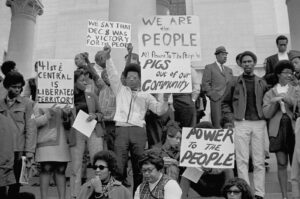Beliefs about Structural Racism and Responses to Societal Racial Inequality
Given the evidence of Americans’ profound misperception of contemporary societal racial stratification, one might hope that simply correcting these misperceptions may lead to greater support for efforts to reduce this inequality. There is considerable evidence, however, that individuals do not necessarily perceive societal inequality as reflective of injustice (e.g., Sidanius & Pratto, 1999). Indeed, exposing Americans to information about racial disparities is unlikely to consistently galvanize broad interest in efforts to close them. In some cases, it may even backfire, leading people to support policies/practices that could make the disparities even worse (e.g., Hetey & Eberhardt, 2014; 2018). Given that awareness of racial inequality does not, in itself, lead to greater interest in its redress, my research explores the psychological factors that help to account for when exposure to racial inequality will garner interest in efforts to reduce it. Specifically, my research has thus far considered one potential contributor to this phenomenon; namely, differences in the acknowledgement of a structural understanding of racism.
Although racism is multifaceted, one dimension on which it can be conceptualized is emerging from two different sources: individuals and structures. Interpersonal racism is characterized by the negative attitudes that individuals endorse regarding members of different racial and/or ethnic groups. When considered at the individual level, racism and racial prejudice are viewed as virtually synonymous. Structural racism, on the other hand, is associated with policies, practices, and/or laws that have a disparate impact on members of particular racial or ethnic groups, regardless of the attitudes of any individual actors. Interpersonal and structural forms of racism are certainly not mutually exclusive, and both are concerning in their own right but, given that a structural understanding of racism more explicitly links racism with racially-disparate outcomes, I thought that it may be particularly influential in explaining when exposure to racial disparities will garner interest in efforts to reduce them.

Thus far, much of this line of research has centered on examining the relationship between beliefs about the structural nature of racism and beliefs about societal racial inequality. For instance, in research examining nationally representative surveys of American adults, my colleagues and I found that endorsement of a structural understanding of racism predicted a wide constellation of beliefs related to perceptions of racial inequality (Rucker & Richeson, 2021; Rucker, Duker & Richeson, in prep). In other work (Craig, Rucker & Brown, in prep), my colleagues and I have found analogous implications of a structural (v. interpersonal) understanding of sexism; namely that, among White women, structural sexism beliefs predict greater feelings of intergroup solidarity with, and higher levels of support policies designed to benefit, members of other marginalized groups (e.g., racial minority group members). My research also suggests that structural discrimination beliefs predict how people respond after being exposed to racial inequality, rather than merely thinking about it in the abstract. For example, I have found that holding relatively structural (v. interpersonal) racism beliefs predicts less support for harsh criminal justice policy initiatives, after exposure to racial inequality in the U.S. prison system (e.g., Rucker et al., in prep).
In other ongoing research, I have started to bridge my two main lines of research through exploring the potential link between beliefs about the structural nature of racism and misperceptions of racial economic inequality. In some preliminary research, my colleagues and I have extended our earlier research (e.g., Kraus, Rucker, & Richeson, 2017, PNAS), finding that holding a relatively structural (v. interpersonal) understanding of racism predicted more accurate estimates of progress toward racial economic equality (Rucker et al., in prep). This greater accuracy in perceptions of racial economic progress, among those with a relatively structural (v. interpersonal) racism view, was explained, in part, by lower perceptions of societal progress toward racial equality, in general. Together, all of these findings provide some encouraging evidence to suggest the importance of accounting for beliefs about structural discrimination may influence perceptions of, and motivations to redress, societal racial inequality.
